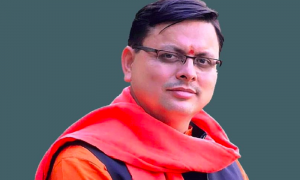The pre-COVID-19 scenario for mental health in India was already a cause for deep concern. One in seven Indians has mental disorders of varying severity, with Indians accounting for almost one quarter of global suicide deaths.
Healthcare delivery organizations are fully seized of the enormity of the mental health toll of the COVID-19 pandemic.
By Dr (Lt Gen) CS Narayanan
It is well known that COVID-19 extracts a huge toll on the mental health of patients and leaves behind a slew of neurological sequelae in its wake. The magnitude of the problem was brought into focus in an article published last week in a journal with one of the highest impact factors in the world. Dr Maxime Taquet and his co-workers analyzed data from an electronic database comprising 81 million health records, and presented their findings in The Lancet. They found that the incidence of 14 neurological and psychiatric disorders ranging from bleeding into the brain to psychosis occurred in more than a third of 236,379 persons who tested positive for SARS-CoV-2 in the preceding six months. Predictably, the more serious consequences were seen in patients who had severe illness requiring hospitalization, and even more in those admitted in intensive care units. However, what is alarming is the wide gamut of mental and neurological disorders seen even those with milder symptoms. Such patients frequently reported being anxious, depressed and having difficulty in sleeping. A higher incidence of frank psychosis manifesting as disorganization of thought processes and personality disorders was also reported. Many survivors of COVID-19 had to battle substance abuse in its immediate aftermath. There was a steep increase in the amount of alcohol consumed by regular drinkers. Persons who had stopped smoking and consuming alcohol resumed their habit in disconcerting numbers. The occurrence of neurodegenerative disorders like Parkinsonism is alarming as this would portend long-term disability in the form of impaired mobility and memory decline.
It has been hypothesized that the causative mechanism for many of the neurological sequelae COVID-19 may be the direct invasion of the nervous system by the virus, an increased tendency to blood clotting or an exaggerated immune response by the body. Various other factors like pre-existing psychiatric illness, prolonged quarantine, perceived lack of organizational support, and social stigma are risk factors. Anxiety, Nervousness, and Post-traumatic stress disorder are often fuelled by fear of infecting other family members, physical distancing, loneliness, and confinement at home in cramped quarters. Patients are often bothered by inconsistent messages and directives regarding public health measures such as wearing face masks, visors, gloves, handwashing, surface decontamination, and mode of transmission of the virus. Various psycho-social factors such as lockdown, economic hardship, and job insecurity, shortage of essential resources, diminished personal freedom and constant media barrage about the Pandemic contribute in
no small measure to the high incidence of psychiatric disorders in COVID-19 survivors. Adverse psychological outcomes include anger, social isolation, and excessive preoccupation with imaginary bodily symptoms. In extreme situations, such patients are driven to suicidal ideation.
Older patients, patients with compromised immunity and those with chronic diseases like diabetes and hypertension are more susceptible. Among patients with pre-existing illnesses, deterioration often occurs due to lack of access to routine medical care. Patients with pre-existing psychiatric illnesses often have relapses necessitating higher doses of medication.
The pandemic has radically transformed the way businesses are run and services delivered. Remote working disrupts a healthy-work life balance. Face to face contact and human interactions which were considered so essential for emotional well-being have taken a backseat. Lack of comforting physical contact like shaking hands and hugging friends is stressful and disconcerting
nline classes and home-schooling have placed a tremendous burden both on students and parents. Lack of access to reliable computer hardware and spotty internet connections, particularly in rural areas and in the economically backward have created a new class divide. Children have been deprived of co-curricular activities, participation in group events and sports which is essential for their holistic development. Mental stress and fatigue have increased manyfold due to the rigours imposed by virtual learning.
The elderly in our society and those in care homes have become particularly vulnerable to emotional breakdown due to isolation and loneliness. Many of them feel neglected and helpless.
The level of domestic violence has risen alarmingly worldwide. According to the World Health Organization (WHO), the Eastern Mediterranean Region has one of the highest prevalence of violence against women worldwide (37%). The risk has risen significantly during the pandemic as family members spend more time in close contact and household stress intensifies. The problem is compounded when families must also cope with potential economic or job losses. As Covid-19 cases surges across the globe, stay-at-home orders have been put in place, schools closed, and many workers have been furloughed, laid off, or
told to work from home. With personal movement limited and people confined to their homes, there has been a dramatic rise in intimate partner violence (IPV). Stay-at-home orders, intended to protect the public and prevent widespread infection, has left many IPV victims trapped with their abusers. One in 4 women and one in 10 men experience IPV. Violence can take various forms – it can be physical, emotional, sexual, or psychological. People of all races, cultures, genders, sexual orientations, socioeconomic classes, and religions experience IPV. It is serious enough that some observers call it a pandemic within a pandemic.
The introduction of vaccines to quell the scourge has brought in its own share of anxiety and mental distress. People are bewildered by the wide array of vaccines that have been introduced, and whether they would have access to vaccination. The conflicting reports of efficacy of the various vaccines, and their propensity to cause side effects like blood clots have aggravated the problem.
Healthcare delivery organizations are fully seized of the enormity of the mental health toll of the COVID-19 pandemic. The pre-COVID-19 scenario for mental health in India was already a cause for deep concern. One in seven Indians has mental disorders of varying severity,with Indians accounting for almost one quarter of global suicide deaths. However, resources are currently overwhelmed and the steep surge of COVID-19 cases across the nation is an ominous sign. Studies have shown that mental health interventions in the workplace are highly effective for mental health promotion and prevention strategies. Organisations have established communication structures, policies and support networks which can be utilised to improve mental health awareness. Organisational leadership has a crucial role to play in ensuring good work-life balance, incentivising healthy behaviours and providing an atmosphere for discussing mental health issues without stigma. Across the world, there has been increasing recognition of the need to provide mental health support to HCWs in the frontline of COVID-19 pandemic. The Indian Government is endeavouring to bridge the gap of access to physical services by promoting telemedicine and telepsychiatry. It has been estimated that over 1 million teleconsultations have been done on the eSanjeevani platform.
While structured systems are being put in place, the public is being educated on some simple measures which can help individuals in coping with the psychological fallout of the pandemic. These include awareness programs in the media to promote consumption of news from reliable sources, not falling prey to rumours on social media, the importance of social connections despite physical distancing, and advocating time-tested measures to promote mental well-being like mindfulness, deep breathing exercises, meditation and yoga.
(The author is an Indian Army Veteran with a career spanning over 38 years, starting with providing combat medical support to soldiers deployed in J&K. He has served as a specialist in Internal Medicine at Military Hospitals Kirkee, Gwalior and Yol Cantt. He is now Head of Dept Neurology, Manipal Hospitals, New Delhi. Email: [email protected] Views are personal.)





































